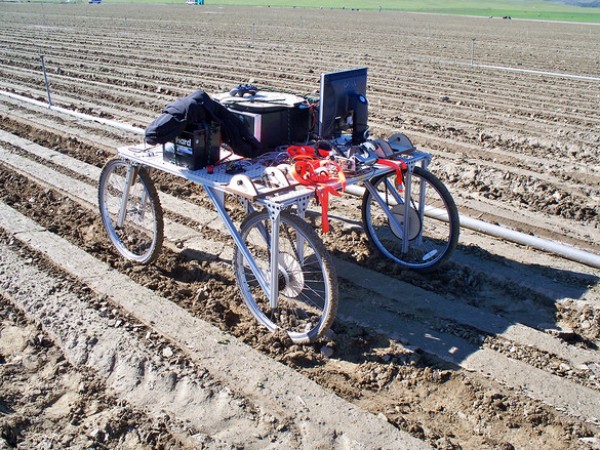With 7 billion mouths to feed, it’s no surprise that agriculture is big business on this planet. When you’re just growing food for your family, the amount of land needed is relatively small. You can take the time to monitor and care for each crop, weeding and fertilizing on a regular basis. When you’re growing thousands of acres, however, it’s impossible to remove all weeds by hand. That’s why most commercial agricultural operations have no problem laying down a thick layer of herbicides on every field.
Herbicides are definitely effective when it comes to killing unwanted plants, the only problem is that most spray herbicides end up on or in something other than their intended target…like the air, water, and yes, the edible plants growing right next to the weeds. With all these negatives piling up, farmers are looking for less-controversial alternatives. According to the recently funded Blue River Technology, those alternatives might come in the form of weed-seeking robots.

For the past few years, Blue River Technology has been working on what they call “organic weed elimination.” Instead of relying on harmful herbicides, the company envisions flocks of autonomous robots that could be programmed to travel up and down crop rows, removing weeds by “hand.” Once it hunts down a weed, the bot injects enough fertilizer to kill it. At first this seems like they’re swapping one negative for another, but remember, there are lots of chemical-free fertilizers.
So far, they’ve only produced a few prototypes, one mounted on a tractor, the other (above) fitted with nimble bicycle tires (no word on what types of fertilizer they used). The rolling robot uses computer vision technology to evaluate the plants as it passes by, using algorithms to detect and differentiate between plants that are right next to each other, or even touching. It may sound far-fetched, but with the recent demand increase for organic foods, there are plenty of people who see promise in the concept.
Just yesterday, the company announced that it has raised $3.1 million in Series A funding led by Khosla Ventures. “With global population expected to increase to 9.5 billion by 2050, increasing food production in a sustainable way is going to be one of the great challenges of this century,” said Vinod Khosla, founder of Khosla Ventures. “Blue River Technology’s solution will not only be more cost effective than current solutions, but has the potential to reduce U.S. herbicide use by over 250 million pounds a year.”